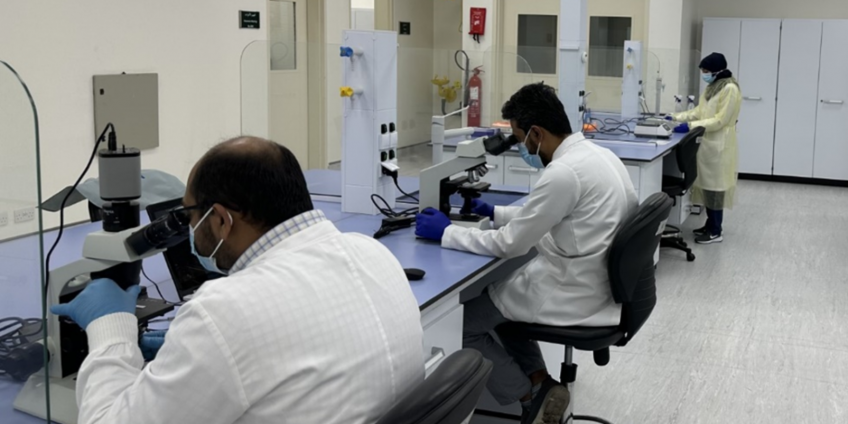
Overview
The Department of Clinical Microbiology has been teaching medical students since 1977. Microbiology is the science of medicine that deals with micro-organisms, i.e., bacteria, viruses, fungi, and parasites, which cause infections/diseases in humans. The department is concerned with teaching the basic properties of the organisms, pathogenesis, laboratory diagnosis, treatment, and prevention of these types of diseases. The department’s faculty members are actively involved in research work and the results of their research have been presented and published in both Saudi Arabian and international medical journals.
Mission
The Department of Clinical Microbiology helps medical students acquire the latest discoveries and information regarding microbiology, immunology and micro-organisms that represent the foundation of different infectious diseases.
Goals
On successful completion of each of the courses outlined below, the medical student should be able to:
- Acquire the ability to recognize and deal with different medical micro-organisms and to know their relationship to the causation of various infectious diseases.
- Participate in protection of the community from the spread of different medical micro-organisms and to limit their ability to cause disease.
Historical Background
In 1975, the department of Clinical Microbiology was established as a part of the establishment of the college of medicine. Before the implementation of the new problem-based curriculum, the department used to teach three separate courses to the 3rd year students:
- Microbiology
- Parasitology, and
- Immunology course.
With the implementation of the new curriculum in 2015, teaching of microbiology, parasitology and immunology became part of the Med 201 (foundation of medicine I) and the Med 301 (foundation of medicine II). The department is also involved in teaching microbiology and immunology courses at different colleges in the university.
The department established its clinical microbiology fellowship program in 2012, and the inaugural class graduated in 2016. This program serves the kingdom by equipping clinicians with cutting-edge expertise in clinical microbiology to the present day.
In 1979 The microbiology diagnostic laboratory was established in King Fahd Hospital of the university, and it is responsible for diagnosing parasitic, bacterial, and fungal infectious diseases. Since its accreditation by the College of American Pathologists (CAP) in 2013, the laboratory has undergone several phases of development, including the implementation of new technologies to ensure accurate identification of microorganisms in a timely manner. It also serves as a training facility for residents, interns, and ID fellows from all over the Kingdom.
The department is in the process of establishing a BSL3 laboratory is expected to be functioning in 2024, which adheres to international standards for safety for mycobacterial identification and is equipped to handle highly infectious pathogens.
Department units /services for clinical departments
The Clinical Microbiology department at KFHU offers microbiological testing to physicians, using advanced diagnostic technology and a team of skilled clinical microbiologists. This includes the microbiology laboratory, mycology, parasitology, molecular diagnostics, and a BSL 3 laboratory. Our diagnostic laboratories process approximately 29,000 samples annually.
Our diagnostic laboratories work closely with the infection control and infectious diseases department to rapidly identify infectious diseases and control outbreaks, and our laboratories are staffed by highly trained and experienced clinical microbiologists and technical staff who can handle and identify highly infectious pathogens.
Aside from the fellowship program, the Microbiology department provides in-training and internships for ID fellows and interns from various institutes around the region.
Members of the department are highly involved in research activities, publishing more than 37 (average) paper a year in high impact journals.
Undergraduate Courses
The department of Clinical Microbiology teaches a wide scope of microbiology courses in the college of Medicine and other heath sector colleges such as Clinical Pharmacy, Dentistry, and Public Health. The table below briefly describes the courses taught by the department for undergraduate students.
Besides these courses, the Department of Clinical Microbiology is also actively involved in digitizing course materials. One example is the "MedMicrobes" app (Playstore/Applestore) that was launched by the department in 2020, provides users firsthand information about clinically significant microorganisms. The app is continuously updated for novel information.

Postgraduate Program
The department of microbiology at the college of medicine offers admission into the Clinical Microbiology Fellowship Program to applicants who want to pursue their career in the field of Clinical Microbiology. Currently, it is the only program available in the eastern region of the kingdom. This 4 years extensive program comprising 88 credit hours modules in total, is locally accredited.
The core modules that are taught during the program tenure include tutorials, lectures, hands-on experience, and rotations between internal and external infectious diseases related departments at King Fahd Hospital of the University, Al-Khobar and other affiliated hospitals and diagnostic laboratories within the kingdom.
Residents undergo basic in-training rotations consisting of hands-on experiences and tutorials in the internal departments of KFHU. As the resident progresses through his/her level of studies, the rotations, and studies advances. They are also sent for rotation outside KFHU. The purpose of external rotation is to expose our residents to a variety of cases and lab tests to diversify their experience and maximize learning. Moreover, elective rotation outside the eastern region, along with the completion of a dissertation and research project, are mandatory modules and requirements for a successful degree award.
Scientific/Educational Activities in the last 5 years
The Department of Microbiology routinely organizes postgraduate academic half-day activities on every Wednesday of the Academic week, in which the Residents, ID fellows and field specialists from various backgrounds discuss the topic under discussion. Aside from resident seminars, professionals and experts from outside universities and hospitals are also invited to share their knowledge.
The list of special activities that were organized by the department of Microbiology during the last five years are listed below.


